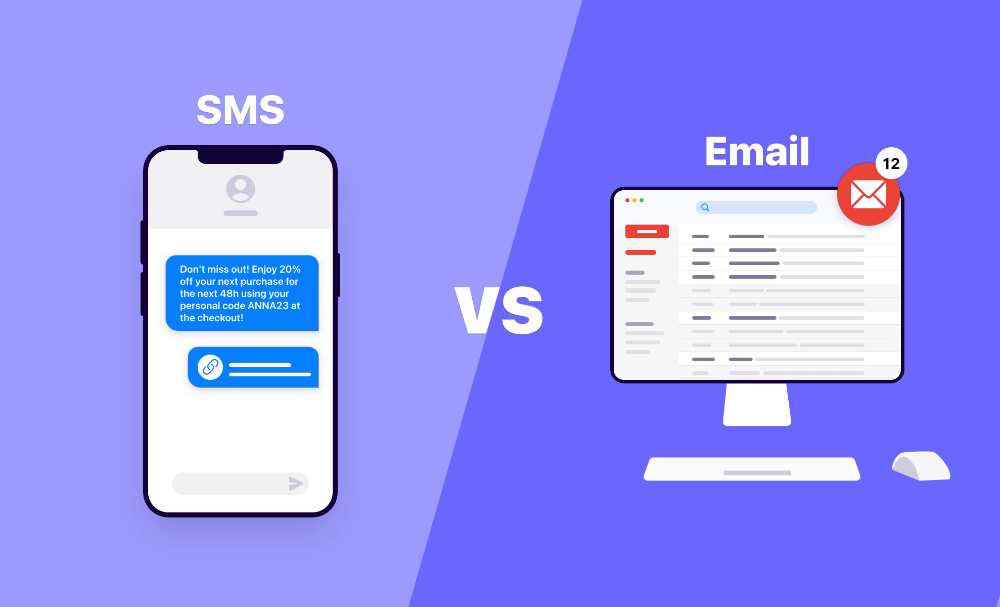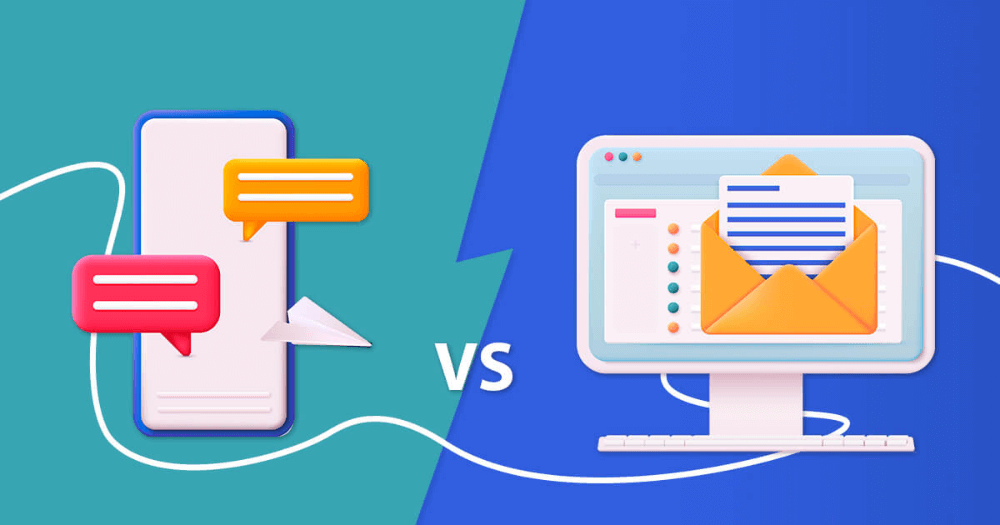📑Table of Contents:

Marketing channels are constantly evolving, but two remain at the core of digital strategy: SMS and email. Both have their strengths, and both can drive results when used correctly. However, when it comes to customer engagement, one often stands out. In this article, we’ll explore the SMS marketing vs. email marketing comparison, look at how each channel performs, and help you decide which strategy fits your goals.
The Basics of SMS Marketing
SMS marketing involves sending promotional or transactional text messages directly to customers’ mobile phones. Messages are short, concise, and instantly delivered. Because of this direct nature, SMS feels personal and grabs attention faster.
Key advantages include:
- High open rates: Studies show SMS messages have open rates of up to 98%.
- Instant delivery: Most texts are read within three minutes.
- Direct engagement: Customers can reply quickly, making SMS feel like a conversation.
However, SMS marketing also has limits. Character restrictions mean you must keep messages short. Additionally, businesses need explicit consent to avoid compliance issues.
The Basics of Email Marketing
Email marketing has been around for decades. It remains a powerful channel because it allows long-form content, rich visuals, and detailed personalization. Emails are often used for newsletters, product announcements, and nurturing campaigns.
Key advantages include:
- Rich formatting: You can add images, videos, and links to enhance communication.
- Scalable campaigns: Email works well for reaching large audiences at once.
- Detailed tracking: Analytics provide insights into clicks, opens, and conversions.
Still, email has challenges. Inbox competition is fierce. Many messages get lost in spam folders or ignored. Average open rates hover around 20%, making engagement harder to achieve compared to SMS.
SMS Marketing vs. Email Marketing: Engagement Rates
When it comes to customer engagement, SMS often has the edge. People check their phones over 150 times a day, which makes text messages hard to miss. Emails, on the other hand, compete with dozens of daily newsletters and promotions.
- Open Rates: SMS (90–98%) vs. Email (15–25%).
- Response Time: SMS responses happen in minutes, while email replies can take hours or days.
- Click-Through Rates: SMS averages around 19%, while email lingers near 2–3%.
These numbers clearly show why SMS marketing often drives stronger real-time engagement.
Strengths of SMS Marketing in Engagement
SMS creates urgency and immediacy. Customers tend to act quickly because messages are short and time-sensitive. For example, a flash sale or appointment reminder sent via SMS feels direct and personal.
Additionally, SMS fosters two-way communication. Unlike traditional email, customers can reply instantly, making the experience interactive. That conversational aspect builds trust and loyalty.
Strengths of Email Marketing in Engagement
While SMS wins on speed and visibility, email shines in depth. It allows detailed storytelling, content sharing, and visual branding. A customer might ignore a text about a new product, but a well-designed email can showcase features, testimonials, and purchase links.
Email also plays a critical role in nurturing long-term relationships. It works best for educational content, loyalty programs, and building brand authority over time.
When to Use SMS vs. Email
The truth is, SMS and email should not compete. Instead, they should complement one another. Use SMS when you need immediate attention. Use email when you want to share in-depth content.
For instance:
- SMS works best for: time-sensitive offers, reminders, alerts, confirmations.
- Email works best for: newsletters, onboarding sequences, and long-form promotions.
By combining both, you create a balanced strategy that maximizes reach and engagement.
The Hybrid Approach: SMS + Email
Forward-thinking marketers no longer see SMS and email as either/or options. Instead, they integrate both into an omnichannel strategy. For example, send a promotional email about a weekend sale, then follow up with a quick SMS reminder on Saturday morning.
This hybrid approach covers both immediacy and detail. It ensures your audience not only sees your message but also gets enough context to take action.
Compliance Considerations
Whether you use SMS or email, compliance matters. SMS falls under strict regulations like TCPA, requiring explicit opt-in. Email marketing is regulated by laws like CAN-SPAM and GDPR, which require unsubscribe options and clear data handling policies. Always make sure you follow these rules to protect customer trust and avoid legal risks.

Final Thoughts
In the SMS marketing vs. email marketing comparison, both channels bring unique strengths. SMS dominates in immediacy and engagement. Email excels in depth and storytelling. The smartest marketers combine both, using SMS for instant impact and email for long-term nurturing.
If your goal is customer engagement, SMS often delivers stronger short-term results. However, when you pair it with email, you unlock a strategy that is both powerful and sustainable.
